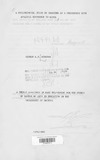| dc.description.abstract | The teaching occupation is central to any education system.
This thesis wants to look at the phenomenon of teaching with
special reference to Kenya. In doing so, it wants to critically
evaluate the various views held on teaching and notably teaching
as a profession.
The thesis starts by examining different views held on
teaching in Kenya. It begins with the traditional society, then
moves to the colonial era, and from the colonial era to the
contemporary erao It looks at the traditional notion of teaching
which was gradually replaced by one in the colonial time that saw
teaching as a vocation. This eventually led to the idea of
teaching as a profession. Currently, teaching in the formal sense
in Kenya is viewed as a profession. This has some direct practical
and theoretical implications.
To understand the implications of holding teaching as a profession,
the thesis starts with a historical perspective. It attempts
to unearth certain historical data and fundamental concepts assumed
to be related to teaching. It looks at the formalization, and westernization
of teaching and the growth of professions. It also looks
at the modern development of the idea of a profession. Within this
context, it evaluates the various definitions of a profession. Eventually
it takes Jackson's definition of a profession as most representative.
Jackson's definition is reduced into a number of criteria
that an occupation must fulfil so as to qualify as a profession.
Using Jackson's criteria of a profession, the thesis attempts
to apply them to teaching in general and to teaching in Kenya particularly.
After a critical analysis it arrives at the conclusion that
certain dimensions ~f a profession are not accounted for in theory and
in practice - within the teaching occupation. It finds that present
day practice and eheory hold teaching as a technique. The idea of
a technique which arises out of specialisation, itself is a new dimension
of a profession that is receiving great emphasis today. Evaluate
ting this trend the thesis finds there 1S no way we can go back to the
ideal of the past, but concludes there 1S urgent need to reconsider
and re-examine the idea of teaching as a profession. It states
that rather than look at the specialisation (technique) aspect
as the only criterion of a profession we should look at what the
thesis considers as a more fundamental aspect of a profession.
Thus, we should focus our attention on one dimension that was
implied in the traditional view of a profession, which is the idea
of truthfulness and altruism, but which in recent times has lest significance.
The thesis finds this would lead to the human dimension
of teaching, which it considers ought to form an essential part
of teaching, if a teacher is to act as a guide - a pointer in lifeo
The thesis ends by stating some implications of this "new"
view or dimension of teaching. | en |

